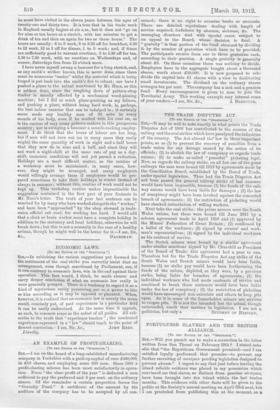THE TRADE DISPUTES ACT.
rTo TUE EDITOR OP TEE SPECTATOR."] SIR,—It may be well to note exactly in what points the Trade Disputes Act of 1906 has contributed to the success of the railway and the coal strikes which have paralysed the industries of the country. The Act altered the law in three important points, so as (1) to prevent the recovery of penalties from a trade union for any damage caused by the action of its officials ; (2) to abolish the law of conspiracy as regards trade unions ; (3) to make so-called "peaceful" picketing legal. Now, as regards the railway strike, on all but one of the great railways the men were bound till 1913 by agreements made by the Conciliation Board, established by the Board of Trade, under special legislation. •Thus had the Trade Disputes Act not been passed the general railway strike of last summer would have been impossible, because (1) the funds of the rail. way unions would have been liable for damages ; (2) the law of conspiracy might have been invoked against the concerted breach of agreements ; (3) the restriction of picketing would have checked intimidation of willing workers.
Next take the coal strike : the prime movers were the South Wales unions, but these were bound till June 1915 by a solemn agreement made in April 1910 and (1) approved by the Miners' Federation of Great Britain ; (2) confirmed by a ballot of the workmen; (3) signed by owners' and work- men's representatives; (4) signed by the individual workman as his contract of service.
The Scotch miners were bound by a similar agreement -under similar sanctions signed by Mr. Churchill as President of the Board of Trade: this agreement had a year to run. Therefore but for the Trade Disputes Act any strike of the South Wales and Scotch miners would have been futile, because (1) no strike pay would have been forthcoming, the funds of the unions, depleted, as they were, by a previous strike, being liable for breaches of agreements ; (2) the individual workmen who had made contracts of service and combined to break those contracts would have been liable under the law of conspiracy ; (3) the restriction of picketing would have encouraged non-unionists and others to keep pits open. As it is, some of the Lanarkshire miners are anxious to reopen pits. It is not the intended but the actual, though unintended, result that matters in legislation. I am not a






































 Previous page
Previous page